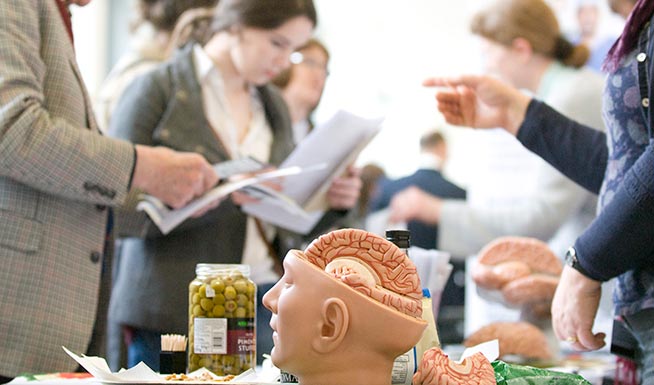
A public open day to showcase groundbreaking medical research that is taking place in Oxford across a range of conditions such as cancer and diabetes will be held at the John Radcliffe Hospital (JR) next month.
Talks, a tour of clinical facilities, stalls and a debate about the opportunities and challenges of sharing patient data will feature in the NIHR Oxford Biomedical Research Centre (BRC) Celebrating Biomedical Research Open Day on Thursday, April 21.
The hospital’s Tingewick Hall will be packed with more than 30 stalls, including hands on exhibits, to demonstrate the work of the BRC, a partnership between the University of Oxford and Oxford University Hospitals NHS Foundation Trust (OUH) to fund and support medical research.
The BRC supports research across 14 Themes including cancer, diabetes, genetics, stroke, infection, surgery, vaccines and others.
Attractions will include a new 55-inch touchscreen computer being used to view cells up close for teaching at the JR, a mobile phone app to assess general fitness, a quiz on which foods contain the most iron, a microscope to view blood slides showing acute leukaemia and spectacles that simulate eye diseases.
Doctors and researchers will be on hand to answer questions about their work with the BRC, which has benefited from more than £150m of investment from the National Institute for Health Research (NIHR) since 2007.
The day will begin with a public tour of the University of Oxford’s Acute Vascular Imaging Centre, at the JR. Here, emergency cases who are eligible for study are taken to a MRI scanner during or after treatment in either the hospital’s Cardiac Catheter Labs or the Emergency Department to study the impact of treatments in real time on the body.
Exhibitions will open in Tingewick Hall, in the hospital’s academic block, from midday to 5pm.
At 12.45pm to 1.45pm a debate “Good to share? Data, research, privacy and the NHS” will be held in adjacent Lecture Theatre 2 on the exciting but often challenging issues around mass sharing of patient data to support research and improve patient care.
Audience members will be encouraged to ask questions of panellists, drawn from a spectrum of viewpoints on the issue, which many clinicians believe is vital to making big leaps in our understanding of disease.
Professor Keith Channon, Director of the Oxford BRC and Dr Bruno Holthof, Chief Executive Officer, OUH will give short keynote speeches at 2pm.
They will be joined by Dr Caroline Hargrove, Technical Director at McLaren Applied Technologies who will talk about how data analysis and simulation tools for motorsport are now driving innovation in surgery and patient care.
Talks by clinicians will then examine some two major healthcare challenges facing research and take questions from the audience.
Professor Adrian Harris, of the University of Oxford Department of Oncology, will talk about “New ways to Treat Cancer” from 3pm to 3.30pm while Dr Matthew Snape, Jenner Investigator and Oxford BRC Consultant in General Paediatrics and Vaccinology, Department of Paediatrics, University of Oxford will speak on “Meningitis Vaccines – can we do more?” from 3.45pm to 4.15pm.